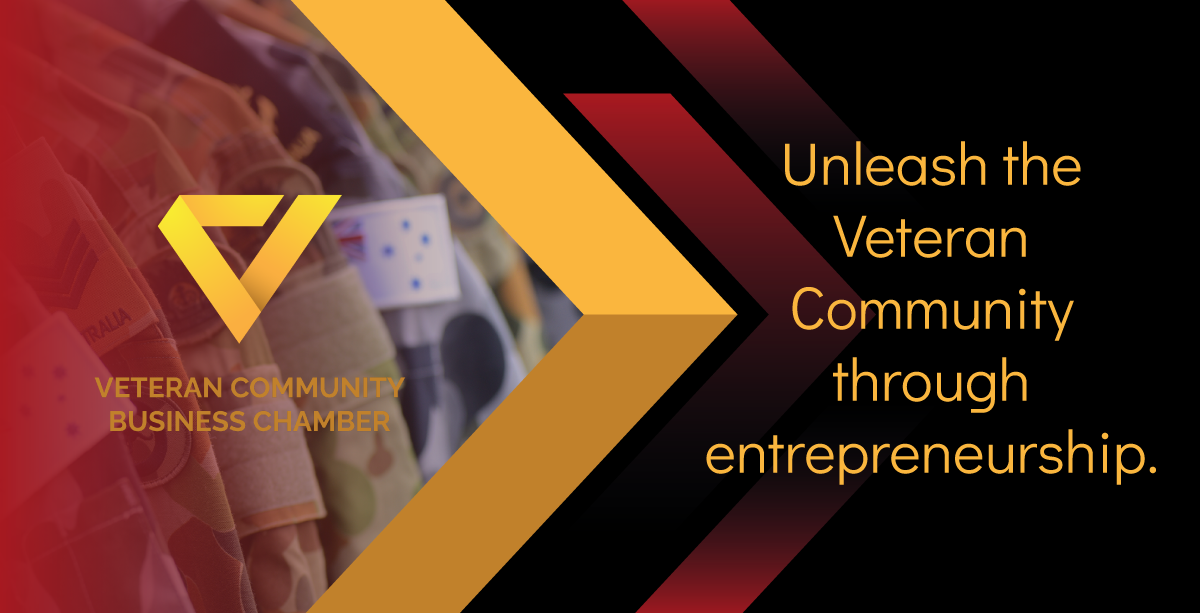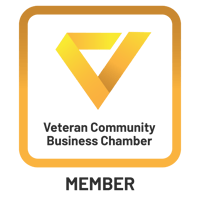Veteran community businesses - the untapped resource for the Australian economy
VCBC Certification and Identification model

THE VETERAN COMMUNITY BUSINESS CHAMBER IDENTIFICATION AND CERTIFICATION MODEL
The Veteran Community Business Chamber (VCBC) has a resounding belief in the people of the veteran community. This community has demonstrated commitment, courage and determination and is well placed to drive new and innovative businesses in Australia. VCBC is here to unleash the potential of the veteran community through entrepreneurship. VCBC is putting the spotlight on veteran entrepreneurship and is here to tell great veteran community success stories in a post military life.
Within Australia, there has been little attention or focus on supporting the veteran community into entrepreneurial pursuits or career paths. This is despite some of Australia's most successful and largest companies coming from the veteran community. The history of the veteran entrepreneur in Australia is both decisive and impactful.
The national carrier and iconic business Qantas was formed by three veterans of the first World War. Using the skills received from cutting edge military training at the time (learning to fly), they took these skills and had a crack at creating a business. They bought a plane, moved to outback QLD and flew it west. The rest is history. Other great Australian companies have been started veterans - Coles supermarkets, Dan Murphy's, JB Holland to name but a few. Our greatest General, John Monash - was a veteran entrepreneur.
At this stage, there is a lack of momentum from the three levels of government in Australia to get onboard and really make an impactful change in veteran community entrepreneurship. With a greater focus in Australia on sovereign capability and the Defence industry, it makes absolute sense to support veteran entrepreneurship initiatives. This captures the training and returns the investment, feeding back into the Defence supply chain with innovative products that support both Defence and sovereign capability.
Where government is lagging, large Australian corporations are getting on board and leading the way in actively seeking VCB's in their procurement channels and diversity in supply chain programs. The reason they are seeking VCB's is the people behind the businesses. They recognise the character, commitment, the skills and training that sits behind the VCB owner. Endorsing VCB's into corporate supply chain is the first step on creating a greater consciousness around veteran procurement in general. With corporate Australia leaning forward and leading the way, it opens the conversation for governments at all levels to take up VCB procurement initiatives and ideally policies.
A key consideration to support veteran community procurement initiatives is identification, certification and assurance.
Identification as a Veteran Community Business.
The first step in developing any initiative is to identify and capture the number of VCB's currently in operation. Current estimates, based up data supplied by the Australian Bureau of Statistics, Queensland University of Technology and Defence Census, suggest there are between 30,000 - 35,000 VCB's currently trading. These estimates are based on existing known data, current Australian entrepreneur participation rate and extrapolated against the size of the veteran community.
One concern with the identification and capture of businesses revolves around the definition of a 'Veteran'. The VCBC definition is the same as the Australian Department of Veteran Affairs which is as follows:
The term 'veteran' traditionally described former Australian Defence Force personnel who were deployed to serve in war or war-like environments. Veterans are now considered people who have any experience in the ADF including permanent, reserve, and former (ex-serving) personnel (Tehan 2017).
The word 'veteran' itself is one that can be rather challenging to the many it represents. Those who may not have served overseas on operations, or had careers in the ADF Reserves only, or those whose military experience was dramatically cut short for any reason may not feel alignment or resonance with the term 'Veteran'.
The VCBC Identification and Certification model actively seeks and supports these people. We acknowledging their military service, inviting them to be full members and to be recognised as a Veteran Community Business (VCB). 
The other important community recognised as a core part of VCBC is the partners and spouses of veterans and members still actively serving. VCBC recognises a strong family unit is a key factor in a successful transition from the military to civilian life. Partners and spouses are an important part of the military community who face their own unique challenges.
For those who are still with active service members, there is the constant requirement to uproot and move to a new location to support the posting cycle. This relocation makes it challenging for partners to maintain consistent employment and also transfer their businesses to new locations. Small business allows partners a level of flexibility to develop geographically transferable careers through self-employment. The ability to create continuity in partner employment is an important component for ADF retention.
Partners also have a key role in supporting veterans both during and after transition. The change from military to civilian life can be a time of great turbulence for both the veteran and their partner. There are many veterans who also transition out of the military through reasons beyond their control or choice. This puts significant pressure on the family unit and a partner / spouse with a business that is profitable, strong and resilient can help relieve other financial pressures that may occur as a result of the transition or in the years ahead.
Partners and spouses of veterans and serving members are welcomed and encourage to join the VCBC as full members and participate in the certification process to be recognised as Veteran Community Businesses.
Certification as a Veteran Community Business
Currently there is no model that actively recognises veterans as per the definition provided by the DVA as above. Therefore, the VCBC has developed a model through actively consultation with the veteran and corporate community. Indigenous certification through Supply Nation was also examined as an example of a community, corporate and government accepted model.

There are three key components in developing the VCBC certification model. A VCBC OWNER is recognised as no less than 50% of the business is owned by a veteran community member (or members). A VCBC OPERATOR is defined as being in direct control of the business through a key leadership role. A VCBC EMPLOYER employer can be earned by demonstrating actual employment within the veteran community.
This certification model is represented by three chevrons. A VCB may apply for certification for all, or any of the chevrons. This will be a visible and clear indicator to demonstrate at a glance their status and contribution to the veteran community.
Assurance within the VCBC certification model
All businesses who have been allowed through licence to display the VCBC chevron identification model have undergone a series of checks to ensure they represent the chevrons with the integrity. The terms of the licence are 12 months where the business will undergo a revision of the certification criteria to ensure they still meet the requirements and intent of the model.
Corporate supporters looking for confidence in their choice to procure from a Veteran Community Business can be assured through the VCBC certification chevrons.
Conclusion
The VCBC certification model is a clear and simple way for Veteran Community Businesses to demonstrate who they are. It also allows those looking for VCB's as either retail, wholesale or corporate procurement to have confidence they are getting what they are looking for.
If you are a Veteran Community Business owner interested in joining the VCBC and being awarded certification, click the link below to start the process.

.jpg?width=50&name=Pete%20Liston%20casual%20(1).jpg)
